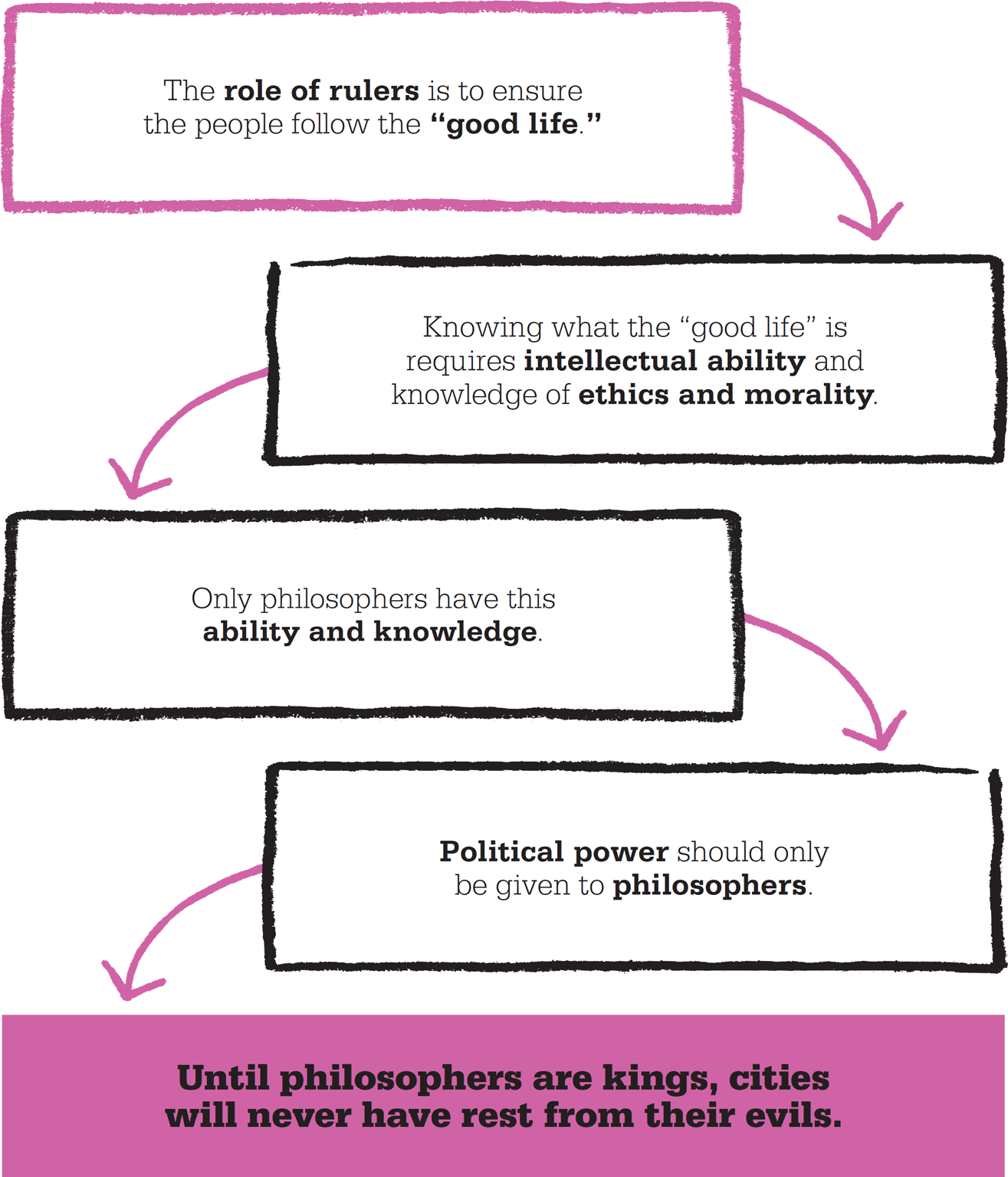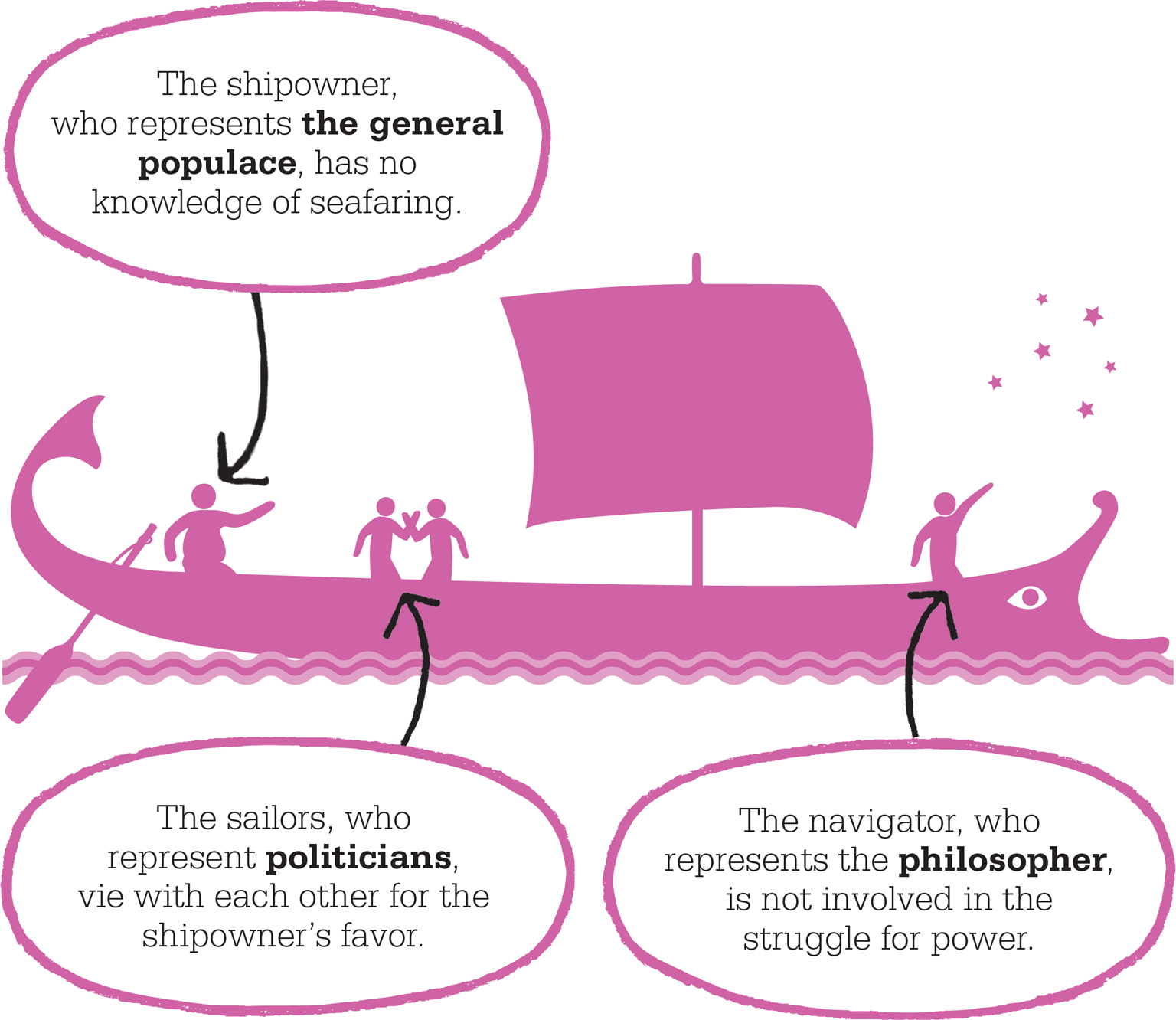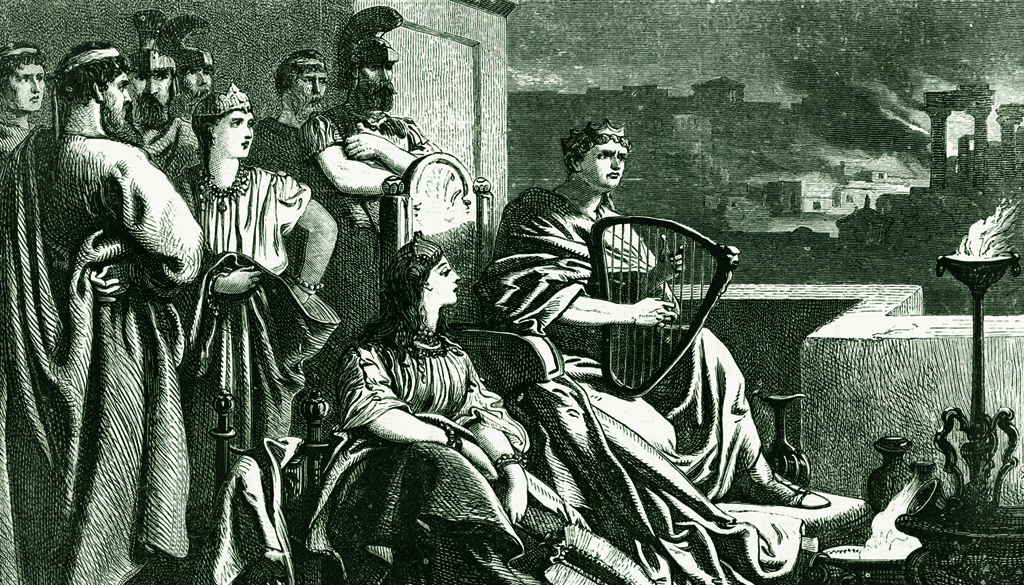
IN CONTEXT
Rationalism
Philosopher kings
594 BCE The Athenian lawmaker Solon lays down laws that act as the foundation for Greek democracy.
c.450 BCE Greek philosopher Protagoras says that political justice is an imposition of human ideas, not a reflection of natural justice.
335–323 BCE Aristotle suggests that polity (constitutional government) is the most practical of the better ways to run a state.
54–51 BCE Cicero writes De republica, advocating a more democratic form of government than suggested by Plato’s Republic.
At the end of the 6th century BCE, a cultural “golden age” began in Greece that was to last for 200 years. Now referred to as the Classical period, it saw the blooming of literature, architecture, science, and, above all, philosophy, all of which profoundly influenced the development of Western civilization.
At the very beginning of the Classical period, the people of the city-state of Athens overthrew their tyrannical leader and instituted a form of democracy. Under this system, government officials were chosen by a lottery from among the citizens, and decisions were taken by a democratic assembly. All the citizens could speak and vote at the assembly—they did not elect representatives to do this on their behalf. It should be noted, however, that the “citizens” were a minority of the population; they were free men aged over 30 whose parents were Athenians. Women, slaves, children, younger men, and foreigners or first-generation settlers were excluded from the democratic process. This political environment quickly made Athens a major cultural center, attracting some of the foremost thinkers of the time. One of the greatest of these was an Athenian named Socrates, whose philosophical questioning of the generally accepted notions of justice and virtue gained him a following of young disciples. Unfortunately, it also attracted unwanted attention from the authorities, who persuaded the democratic assembly to issue Socrates with a death sentence, on charges of corrupting the young. One of Socrates’ young followers was Plato, who shared his teacher’s inquisitive nature and skeptical attitude. Plato was to become disillusioned with the Athenian system after what he saw as its unfair treatment of his teacher.
"Democracy passes into despotism."
Plato
Plato went on to become as influential a philosopher as Socrates, and toward the end of his career he turned his considerable intellect to the business of politics, most famously in the Republic. Unsurprisingly, given that he had seen Socrates condemned and was himself from a noble family, Plato had little sympathy for democracy. But neither did he find much to commend in any other existing form of government, all of which he believed led the state into “evils.”

The good life
To understand what Plato meant by “evils” in this context, it is important to bear in mind the concept of eudaimonia, the “good life,” which for ancient Greeks was a vital aim. “Living well” was not a question of achieving material well-being, honor, or mere pleasure, but rather living according to fundamental virtues such as wisdom, piety, and above all, justice. The purpose of the state, Plato believed, was to promote these virtues so that its citizens could lead this good life. Issues such as protection of property, liberty, and stability were only important in so far as they created conditions that allowed citizens to live well. In his opinion, however, no political system had yet existed that fulfilled this objective—and the defects within them encouraged what he saw as “evils,” or the opposite of these virtues.
The reason for this, Plato maintained, is that rulers, whether in a monarchy, oligarchy (rule of the few), or democracy, tend to rule in their own interests rather than for the good of the state and its people. Plato explains that this is due to a general ignorance of the virtues that constitute the good life, which in turn leads people to desire the wrong things, especially the transitory pleasures of honor and wealth. These prizes come with political power, and the problem is intensified in the political arena. The desire to rule, for what Plato saw as the wrong reasons, leads to conflict among citizens. With everyone seeking increased power, this ultimately undermines the stability and unity of the state. Whoever emerges victorious from the power struggle deprives his opponents of the power to achieve their desires, which leads to injustice—an evil that is exactly contrary to the cornerstone of Plato’s notion of the good life.
In contrast, Plato argued, there is a class of people who understand the meaning of the good life: philosophers. They alone recognize the worth of virtues above the pleasures of honor and money, and they have devoted their lives to the pursuit of the good life. Because of this, they do not lust after fame and fortune, and so have no desire for political power—paradoxically this is what qualifies them as ideal rulers. On face value, Plato’s argument would seem to be simply that “philosophers know best,” and (coming from a philosopher) might appear to contradict his assertion that they have no desire to rule, but behind it he gives a much richer and more subtle reasoning.
Ideal Forms
From Socrates, Plato had learned that virtue is not innate, but dependent on knowledge and wisdom, and in order to lead a virtuous life it is necessary first to understand the essential nature of virtue. Plato developed his mentor’s ideas, showing that while we might recognize individual instances of qualities such as justice, goodness, or beauty, this does not allow us to understand what gives them their essential nature. We might imitate them—acting in a way that we think is just, for example—but this is mere mimicry rather than truly behaving according to those virtues.
"The chief penalty is to be governed by someone worse if a man will not himself hold office and rule."
Plato
In his Theory of Forms, Plato suggested the existence of ideal archetypes of these virtues (and of everything that exists) that consist of the essence of their true nature; this means that what we see as instances of these virtues are only examples of these Forms, and may show only a part of their nature. They are like inadequate reflections or shadows of the real Forms.
These ideal Forms, or Ideas, as Plato called them, exist in a realm outside the world we live in, accessible only via philosophical reasoning and inquiry. It is this that makes philosophers uniquely qualified to define what constitutes the good life, and of leading a truly virtuous life, rather than simply imitating individual examples of virtue. Plato had already demonstrated that to be good, the state has to be ruled by the virtuous, and while others value money or honor above all, only philosophers value knowledge and wisdom, and therefore virtue. It follows then that only the interests of philosophers benefit the state, and therefore “philosophers must become kings.” Plato goes as far as to suggest that they should be compelled to take positions of power, in order to avoid the conflict and injustice inherent in other forms of government.

Socrates chose to drink poison rather than renounce his views. The trial and conviction of Socrates caused Plato to doubt the virtues of the democratic political system of Athens.
Educating kings
Plato recognizes that this is a utopian stance, and goes on to say, “…or those now called kings must genuinely and adequately philosophize,” suggesting the education of a potential ruling class as a more practical proposition. In his later dialogues Statesman and Laws, he describes a model for a state in which this can be achieved, teaching the philosophical skills necessary to understanding the good life, in the same way as any other skills that can be of use to society. However, he points out that not every citizen has the aptitude and intellectual ability to learn these skills. He suggests that where this education is appropriate—for a small, intellectual elite—it should be enforced rather than offered. Those chosen for power because of their “natural talents” should be separated from their families and reared in communes, so that their loyalties are to the state.
Plato’s political writings were influential in the ancient world, in particular in the Roman empire, and echoed the notions of virtue and education in the political philosophy of Chinese scholars such as Confucius and Mozi. It is even possible that they influenced Chanakya in India when he wrote his treatise on training potential rulers. In medieval times, Plato’s influence spread to the Islamic empire and to Christian Europe, where Augustine incorporated them into the teachings of the Church. Later, Plato’s ideas were overshadowed by those of Aristotle, whose advocacy of democracy worked better with the political philosophers of the Renaissance.
"Democracy… is full of variety and disorder, dispensing a sort of equality to equals and unequals alike."
Plato
Plato’s political notions have been seen as unacceptably authoritarian and elitist by later thinkers, and they fell out of favor with many in the modern world while it struggled to establish democracy. He has been criticized as advocating a totalitarian, or at best paternalistic, system of government run by an elite that claims to know what is best for everyone else. Recently, however, his central notion of a political elite of “philosopher kings” has been reappraised by political thinkers.

Plato used the metaphor of the ship of state to explain why philosophers should be kings. Though he does not seek power, the navigator is the only one who can steer a proper course—much as the philosopher is the only one with the knowledge to rule justly.

Emperor Nero is said to have stood by and done nothing to help while a fire raged in the city of Rome. Plato’s ideal of a philosopher king has been blamed by some for the rise of such tyrants.
PLATO

Born around 427 BCE, Plato was originally called Aristocles, later acquiring the nickname Plato (meaning “broad”) because of his muscular physique. From a noble Athenian family, he was probably expected to follow a career in politics, but instead became a disciple of the philosopher Socrates and was present when his mentor chose to die rather than renounce his views.
Plato traveled widely around the Mediterranean before returning to Athens, where he established a school of philosophy, the Academy, which numbered among its students the young Aristotle. While teaching, he wrote a number of books in the form of dialogues, generally featuring his teacher Socrates, exploring ideas of philosophy and politics. He is believed to have carried on teaching and writing well into his later years, and died at about the age of 80 in 348/347 BCE.
Key works
c.399–387 BCE Crito
c.380–360 BCE Republic
c.355–347 BCE Statesman, Laws
